- Home
- John Scalzi
Old Man's War Page 23
Old Man's War Read online
Page 23
“Score one for genetics,” Harry said.
Asshole suddenly clicked to life. Corporal Perry, the message read. Your presence is required at a briefing with General Keegan at 1000 hrs at Operational HQ in the Eisenhower Module of Phoenix Station. Be prompt. I acknowledged the message and told Harry and Jesse.
“And I thought I had friends in interesting places,” Harry said. “You’ve been holding out on us, John.”
“I have no idea what this is about,” I said. “I’ve never met Keegan before.”
“He’s only the commander of the CDF Second Army,” Harry said. “I’m sure it’s nothing important.”
“Funny,” I said.
“It’s 0915 now, John,” Jesse said. “You’d better get moving. You want us to walk with you?”
“No, please finish breakfast,” I said. “It’ll be good for me to have the walk. The Eisenhower Module is only a couple of klicks around the station. I can make it in time.” I got up, grabbed a donut to eat on the way, gave Jesse a friendly peck on the cheek and headed off.
In fact, the Eisenhower Module was more than a couple of klicks away, but my leg had finally grown in, and I wanted the exercise. Dr. Fiorina was right—the new leg did feel better than new, and overall I felt as if I had more energy. Of course, I had just recovered from injuries so grave it was a miracle that I lived. Anyone would feel like they had more energy after that.
“Don’t turn around,” Jane said, into my ear, from directly behind me.
I nearly choked on a bite of donut. “I wish you wouldn’t keep sneaking up on me,” I finally said, not turning around.
“Sorry,” she said. “I’m not intentionally trying to annoy you. But I shouldn’t be talking to you. Listen, this briefing you’re about to go to.”
“How do you know about that?” I said.
“It doesn’t matter. What matters is that you agree to what they ask of you. Do it. It’s the way you’re going to be safe for what’s coming up. As safe as can be.”
“What’s coming up?” I asked.
“You’ll find out soon enough,” she said.
“What about my friends,” I said. “Harry and Jesse. Are they in trouble?”
“We’re all in trouble,” Jane said. “I can’t do anything for them. I worked to sell you as it is. Do this. It’s important.” There was a quick touch of a hand on my arm, and then I could tell she was gone again.
“Corporal Perry,” General Keegan said, returning my salute. “At ease.”
I had been escorted into a conference room with more brass in it than an eighteenth-century schooner. I was easily the lowest-ranking person in the room; the next lowest rank, as far as I could tell, as a lieutenant colonel, was Newman, my esteemed questioner. I felt a little queasy.
“You look a little lost, son,” General Keegan said to me. He looked, as did everyone in the room, and every soldier in the CDF, no more than in his late twenties.
“I feel a little lost, sir,” I said.
“Well, that’s understandable,” Keegan said. “Please, sit down.” He motioned to an empty chair at the table; I took it and sat down. “I’ve heard a lot about you, Perry.”
“Yes, sir,” I said, trying not to glance over at Newman.
“You don’t sound excited about that, Corporal,” he said.
“I’m not trying to be noticed, sir,” I said. “Just trying to do my part.”
“Be that as it may, you have been noticed,” Keegan said. “A hundred shuttles managed to get launched over Coral, but yours was the only one to make it to the surface, in great part due to your orders to pop the shuttle bay doors and get the hell out of there.” He jerked a thumb to Newman. “Newman here’s been telling me all about it. He thinks we should give you a medal for it.”
Keegan could have said, Newman thinks you should star in the army’s annual performance of Swan Lake, and I would not have been as surprised as I was. Keegan noticed the expression on my face and grinned. “Yes, I know what you were thinking. Newman has the best straight face in the business, which is why he has the job he does. Well, what about it, Corporal? Think you deserve that medal?”
“Respectfully, sir, no,” I said. “We crashed and there were no survivors other than myself. It’s hardly meritorious service. Beyond that, any praise in making it to the surface of Coral belongs to my pilot, Fiona Eaton.”
“Pilot Eaton has already been decorated posthumously, Corporal,” General Keegan said. “Small consolation to her, being dead as she is, but it’s important to the CDF that such actions are noted somewhere by us. And despite your modesty, Corporal, you will be decorated as well. Others survived the Battle of Coral, but that was by luck. You took initiative and showed leadership in an adverse situation. And you’ve shown your capacity to think on your feet before. That firing solution against the Consu. Your leadership in your training platoon. Master Sergeant Ruiz made special note of your use of the BrainPal in the final training war game. I served with that son of a bitch, Corporal. Ruiz wouldn’t compliment his mother for giving birth to him, if you know what I mean.”
“I think I do, sir,” I said.
“That’s what I thought. So a Bronze Star for you, son. Congratulations.”
“Yes, sir,” I said. “Thank you, sir.”
“But I didn’t ask you here for that purpose,” General Keegan said, and then motioned down the table. “I don’t believe you’ve met General Szilard, who heads our Special Forces. At ease, no need to salute.”
“Sir,” I said, nodding in his direction, at least.
“Corporal,” Szilard said. “Tell me, what have you heard about the situation over Coral?”
“Not very much, sir,” I said. “Just conversations with friends.”
“Really,” Szilard said, dryly. “I would think your friend Private Wilson would have given you a comprehensive briefing by now.”
I was beginning to realize that my poker face, never very good, was even less so these days. “Yes, of course we know about Private Wilson,” Szilard said. “You might want to tell him that his snooping around is not nearly as subtle as he thinks it is.”
“Harry will be surprised to hear it,” I said.
“No doubt,” Szilard said. “I also have no doubt he’s also appraised you on the nature of the Special Forces soldiers. It’s not a state secret, incidentally, although we don’t put information on the Special Forces in the general database. Most of our time is spent on missions that require strict secrecy and confidentiality. We have very few opportunities to spend much time with the rest of you. Not much inclination either.”
“General Szilard and Special Forces are taking the lead on our counterattack on the Rraey at Coral,” General Keegan said. “While we intend to take the planet, our immediate concern is to isolate their tachyon detection apparatus, disable it without destroying it if we can, but destroy it if we must. Colonel Golden here”—Keegan motioned to a somber-looking man next to Newman—“believes we know where it is. Colonel.”
“Very briefly, Corporal,” Golden said. “Our surveillance before the first attack on Coral showed the Rraey deploying a series of small satellites in orbits around Coral. At first we thought them to be spy satellites to help the Rraey identify Colonial and troop movement on the planet, but now we think it’s an array designed to spot tachyon patterns. We believe the tracking station, which compiles the data from the satellites, is on the planet itself, landed there during the first wave of the attack.”
“We think it’s on the planet because they figure it’s safest there,” General Szilard said. “If it were on a ship, there’s a chance an attacking CDF ship might hit it, if only by sheer luck. And as you know, no ship but your shuttle got anywhere close to the Coral surface. It’s a good bet it’s there.”
I turned to Keegan. “May I ask a question, sir.”
“Go ahead,” Keegan said.
“Why are you telling me this?” I asked. “I’m a corporal with no squad, platoon or battalion. I can’t see why
I should need to know this.”
“You need to know this because you’re one of the few survivors of the Battle of Coral, and the only one that survived by something more than chance,” Keegan said. “General Szilard and his people believe, and I agree, that their counterattack has a better chance of succeeding if someone who was there in the first attack advises and observes the second. That means you.”
“With all due respect, sir,” I said. “My participation was minimal and disastrous.”
“Less disastrous than almost everyone else’s,” Keegan said. “Corporal, I won’t lie to you—I’d prefer we’d have someone else in this role. However, as it stands, we do not. Even if the amount of advice and service you can give is minimal, it is better than nothing at all. Besides, you’ve shown the ability to improvise and act quickly in combat situations. You will be of use.”
“What would I do?” I asked. Keegan glanced over to Szilard.
“You’d be stationed on the Sparrowhawk,” Szilard said. “They represent the Special Forces with the most experience in this particular situation. Your job would be to advise the Sparrowhawk senior staff on your experience at Coral, observe, and act as liaison between CDF regular forces and Special Forces if one is required.”
“Would I fight?” I asked.
“You’re a supernumerary,” Szilard said. “You would most likely not be required to participate in the actual engagement.”
“You understand that this assignment is highly unusual,” Keegan said. “As a practical matter, due to differences in mission and in personnel, regular CDF and Special Forces are almost never mixed. Even in battles in which the two forces are engaged against a single enemy, both tend to perform separate and mutually exclusive roles.”
“I understand,” I said. I understood more than they knew. Jane was stationed on the Sparrowhawk.
As if following my train of thought, Szilard spoke up. “Corporal, I do understand that you had an incident with one of my people—one stationed on the Sparrowhawk. I need to know that there will be no other incidents like that one.”
“Yes, sir,” I said. “The incident was over a misunderstanding. A case of mistaken identity. It won’t happen again.”
Szilard nodded to Keegan. “Very well,” Keegan said. “Corporal, given your new role, I think your rank is deficit to the task. You are hereby promoted to lieutenant, effective immediately, and will present yourself to Major Crick, CO of the Sparrowhawk, at 1500. That should give you enough time to get your things in order and say your good-byes. Any questions?”
“No, sir,” I said. “But I have one request.”
“Not the usual thing,” Keegan said, after I had finished. “And in other circumstances—in both cases—I would say no.”
“I understand, sir,” I said.
“However, it will be arranged. And some good might come out of it. Very well, Lieutenant. You’re dismissed.”
Harry and Jesse met me as soon as they could after I messaged them. I told them of my assignment and promotion.
“You think Jane engineered this,” Harry said.
“I know she did,” I said. “She told me she had. As it happens, I may actually turn out to be useful in some way. But I’m sure she planted a bug in someone’s ear. I’m on my way in just a few hours.”
“We’re being broken up again,” Jesse said. “And what’s left of Harry’s and my platoon is being split up, too. Our platoon mates are getting assignments to other ships. We’re waiting to hear our own assignments.”
“Who knows, John,” Harry said. “We’ll probably be back at Coral with you.”
“No, you won’t,” I said. “I asked General Keegan to advance you both out of general infantry and he agreed. Your first term of service is done. You’ve both been reassigned.”
“What are you talking about?” Harry said.
“You’ve been reassigned to CDF’s Military Research arm,” I said. “Harry, they knew about you snooping around. I convinced them you’d do less harm to yourself and others this way. You’re going to work on whatever we bring back from Coral.”
“I can’t do that,” Harry said. “I don’t have the math for it.”
“I’m sure you won’t let that stop you,” I said. “Jesse, you’re going to MR, too, on the support staff. It’s all I could get you on short notice. It’s not going be very interesting, but you can train for other roles while you’re there. And you’ll both be out of the line of fire.”
“This isn’t right, John,” Jesse said. “We haven’t served our time. Our platoon mates are going back out to fight while we’ll be sitting here for something we didn’t do. You’re going back out there. I don’t want this. I should serve my time.” Harry nodded.
“Jesse, Harry, please,” I said. “Look. Alan is dead. Susan and Thomas are dead. Maggie is dead. My squad and my platoon are all gone. Everyone I’ve ever cared about out here is gone but you two. I had a chance to keep you two alive and I took it. I couldn’t do anything for anyone else. I can do something for you. I need you to be alive. You’re all I have out here.”
“You have Jane,” Jesse said.
“I don’t know what Jane is to me yet,” I said. “But I know what you are to me. You’re my family now. Jesse, Harry. You’re my family. Don’t be angry with me for wanting to keep you safe. Just be safe. For me. Please.”
FIFTEEN
Sparrowhawk was a quiet ship. Your average troopship is filled with the sounds of people talking, laughing, yelling and going through the verbal motions of their lives. Special Forces soldiers don’t do any of that crap.
As was explained to me by the Sparrowhawk’s CO when I came on board. “Don’t expect people to talk to you,” Major Crick said as I presented myself.
“Sir?” I said.
“The Special Forces soldiers,” he said. “It’s not anything personal, it’s just we’re not much for talking. When we’re by ourselves, we communicate almost exclusively by BrainPal. It’s faster, and we don’t have a bias toward talking, like you do. We’re born with BrainPals. The first time anyone ever talks to us, it’s with one of them. So it’s the way we talk most of the time. Don’t be offended. Anyway, I’ve ordered the troops to speak to you if they have something they need to get across.”
“That’s not necessary, sir,” I said. “I can use my BrainPal.”
“You wouldn’t be able to keep up,” Major Crick said. “Your brain is set to communicate at one speed, and ours at another. Talking to realborn is like talking at half speed. If you’ve talked to any of us for a great deal of time, you might notice we seem abrupt and curt. It’s a side effect of feeling like you’re talking to a slow child. No offense.”
“None taken, sir,” I said. “You seem to communicate well.”
“Well, as a CO, I spend a lot of time with non-Special Forces,” Crick said. “Also, I’m older than most of my troops. I’ve picked up a few social graces.”
“How old are you, sir?” I asked.
“I’ll be fourteen next week,” he said. “Now, I’ll be having a staff meeting tomorrow at 0600. Until then, get yourself set up and comfortable, have some chow, and get a little rest. We’ll talk more in the morning.” He saluted and I was dismissed.
Jane was waiting in my quarters.
“You again,” I said, smiling.
“Me again,” she said, simply. “I wanted to know how you’re getting along.”
“Fine,” I said. “Considering I’ve been on the ship for fifteen minutes.”
“We’re all talking about you,” Jane said.
“Yes, I can tell by the endless chatter,” I said. Jane opened her mouth to speak, but I held up my hand. “That was a joke,” I said. “Major Crick told me about the BrainPal thing.”
“It’s why I like talking to you like this,” Jane said. “It’s not like talking to anyone else.”
“I seem to remember you talking when you rescued me,” I said.
“We were worried about being tracked then,” Jane said
. “Speaking was more secure. We also speak when we’re out in public. We don’t like to draw attention to ourselves when we don’t have to.”
“Why did you arrange this?” I asked her. “Getting me stationed here on the Sparrowhawk.”
“You’re useful to us,” Jane said. “You have experience that may be useful, both on Coral and for another element of our preparation.”
“What does that mean?” I asked.
“Major Crick will talk about it tomorrow at the briefing,” Jane said. “I’ll be there, too. I command a platoon and do intelligence work.”
“Is that the only reason?” I asked. “That I’m useful?”
“No,” Jane said, “but it’s the reason that got you onto the ship. Listen, I won’t be spending too much time with you. I have too many things to do preparing for our mission. But I want to know about her. About Kathy. Who she was. What she was like. I want you to tell me.”
“I’ll tell you about her,” I said. “On one condition.”
“What?” Jane asked.
“You have to tell me about you,” I said.
“Why?”
“Because for nine years I’ve been living with the fact my wife is dead, and now you’re here and it’s messing me up inside,” I said. “The more I know about you, the more I can get used to the idea that you’re not her.”
“I’m not that interesting,” Jane said. “And I’m only six. That’s hardly any time to have done anything.”
“I’ve done more things in the last year than I did in all the years leading up to it,” I said. “Trust me. Six years is enough.”
“Sir, want company?” the nice young (probably four-year-old) Special Forces soldier said as he and four of his buddies held their meal trays at attention.
“The table’s empty,” I said.
“Some people prefer to eat alone,” the soldier said.
“I’m not one of them,” I said. “Please, sit, all of you.”
“Thank you, sir,” the soldier said, putting his tray on the table. “I’m Corporal Sam Mendel. These are Privates George Linnaeus, Will Hegel, Jim Bohr, and Jan Fermi.”

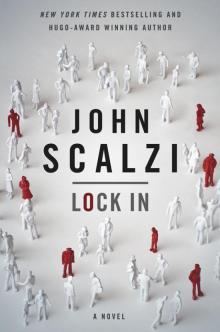 Lock In
Lock In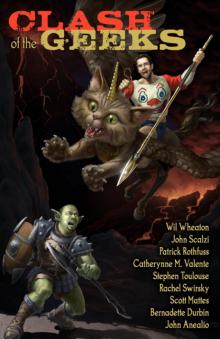 Clash of the Geeks
Clash of the Geeks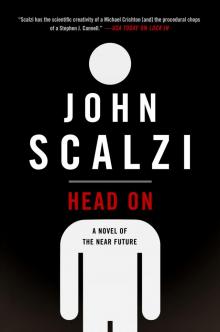 Head On
Head On The Dog King
The Dog King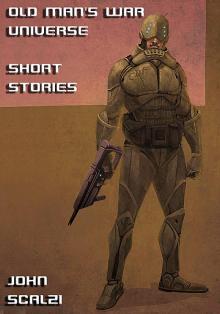 Old Man's War Universe: Short Stories
Old Man's War Universe: Short Stories The End of All Things
The End of All Things Tales From the Clarke
Tales From the Clarke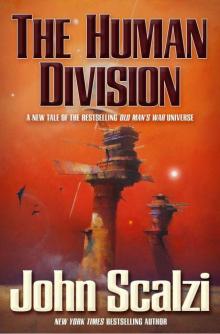 The Human Division
The Human Division The Android's Dream
The Android's Dream An Election
An Election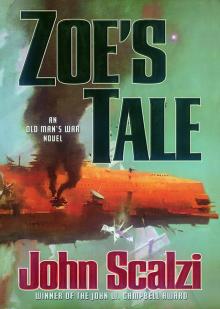 Zoe's Tale
Zoe's Tale Agent to the Stars
Agent to the Stars This Hollow Union
This Hollow Union The Gentle Art of Cracking Heads
The Gentle Art of Cracking Heads Old Man's War
Old Man's War The Tale of the Wicked
The Tale of the Wicked Your Hate Mail Will Be Graded: A Decade of Whatever, 1998-2008
Your Hate Mail Will Be Graded: A Decade of Whatever, 1998-2008 Judge Sn Goes Golfing
Judge Sn Goes Golfing The Back Channel
The Back Channel The Human Division 0.5 - After the Coup
The Human Division 0.5 - After the Coup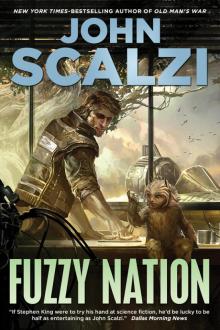 Fuzzy Nation
Fuzzy Nation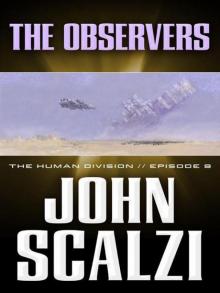 The Observers
The Observers This Must Be the Place
This Must Be the Place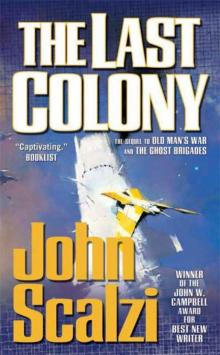 The Last Colony
The Last Colony Unlocked: An Oral History of Haden's Syndrome
Unlocked: An Oral History of Haden's Syndrome A Voice in the Wilderness
A Voice in the Wilderness Redshirts
Redshirts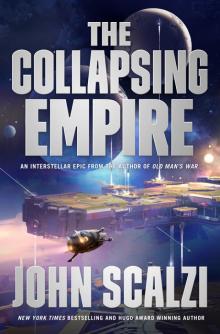 The Collapsing Empire
The Collapsing Empire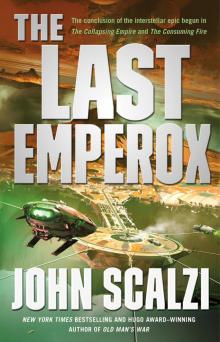 The Last Emperox
The Last Emperox The God Engines
The God Engines A Problem of Proportion
A Problem of Proportion THAT WAS THE MILLENIUM THAT WAS
THAT WAS THE MILLENIUM THAT WAS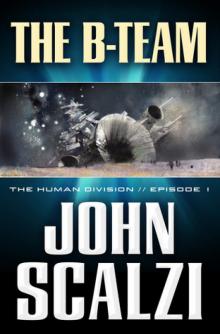 The B-Team
The B-Team The Sound of Rebellion
The Sound of Rebellion The President's Brain Is Missing
The President's Brain Is Missing Questions for a Soldier
Questions for a Soldier Walk the Plank
Walk the Plank We Only Need the Heads
We Only Need the Heads How I Proposed to My Wife: An Alien Sex Story
How I Proposed to My Wife: An Alien Sex Story Earth Below, Sky Above
Earth Below, Sky Above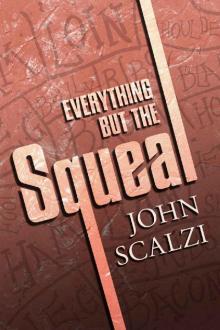 Everything but the Squeal
Everything but the Squeal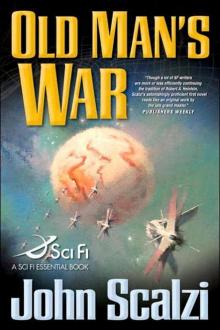 Old Man’s War
Old Man’s War The Human Division #12: The Gentle Art of Cracking Heads
The Human Division #12: The Gentle Art of Cracking Heads This Must Be the Place thd-10
This Must Be the Place thd-10 A Voice in the Wilderness thd-4
A Voice in the Wilderness thd-4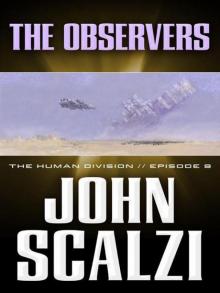 The Observers thd-9
The Observers thd-9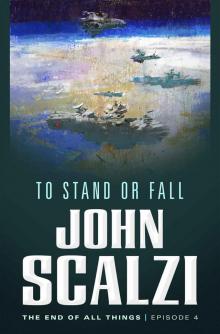 The End of All Things: The Fourth Instalment
The End of All Things: The Fourth Instalment Earth Below, Sky Above thd-13
Earth Below, Sky Above thd-13 Zoe`s Tale вбиос-4
Zoe`s Tale вбиос-4 After the Coup
After the Coup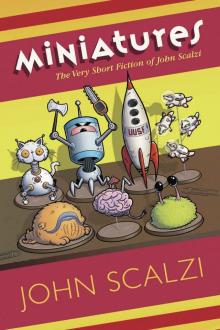 Miniatures: The Very Short Fiction of John Scalzi
Miniatures: The Very Short Fiction of John Scalzi The Last Colony вбиос-3
The Last Colony вбиос-3 Tales From the Clarke thd-5
Tales From the Clarke thd-5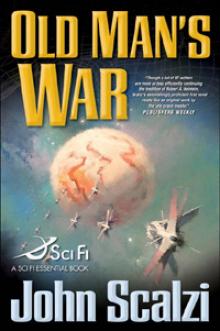 Old Man's War omw-1
Old Man's War omw-1 The Human Division #8: The Sound of Rebellion
The Human Division #8: The Sound of Rebellion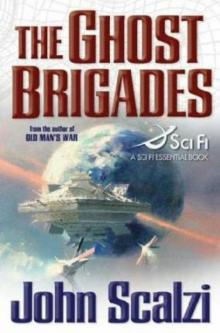 The Ghost Brigades omw-2
The Ghost Brigades omw-2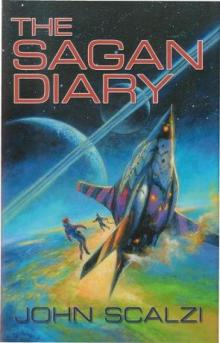 The Sagan Diary (old man's war)
The Sagan Diary (old man's war) The Sound of Rebellion thd-8
The Sound of Rebellion thd-8 The Human Division 13 - Earth Below, Sky Above
The Human Division 13 - Earth Below, Sky Above Head On_A Novel of the Near Future
Head On_A Novel of the Near Future The End of All Things: The First Instalment
The End of All Things: The First Instalment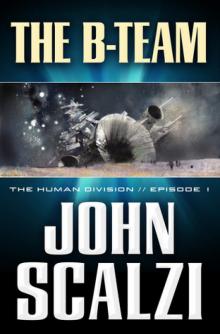 The B-Team thd-1
The B-Team thd-1 The Back Channel thd-6
The Back Channel thd-6 Walk the Plank thd-2
Walk the Plank thd-2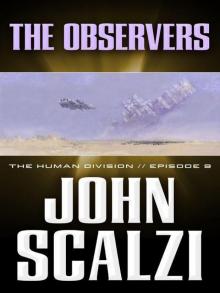 The Human Division #9: The Observers
The Human Division #9: The Observers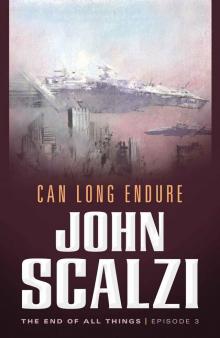 The End of All Things: The Third Instalment
The End of All Things: The Third Instalment The Human Division #10: This Must Be the Place
The Human Division #10: This Must Be the Place The End of All Things #2: This Hollow Union
The End of All Things #2: This Hollow Union We Only Need the Heads thd-3
We Only Need the Heads thd-3 Metatropolis
Metatropolis The Dog King thd-7
The Dog King thd-7 The Consuming Fire (The Interdependency)
The Consuming Fire (The Interdependency)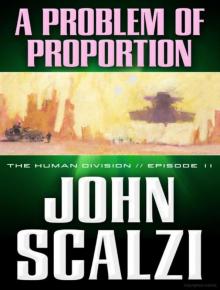 The Human Division #11: A Problem of Proportion
The Human Division #11: A Problem of Proportion